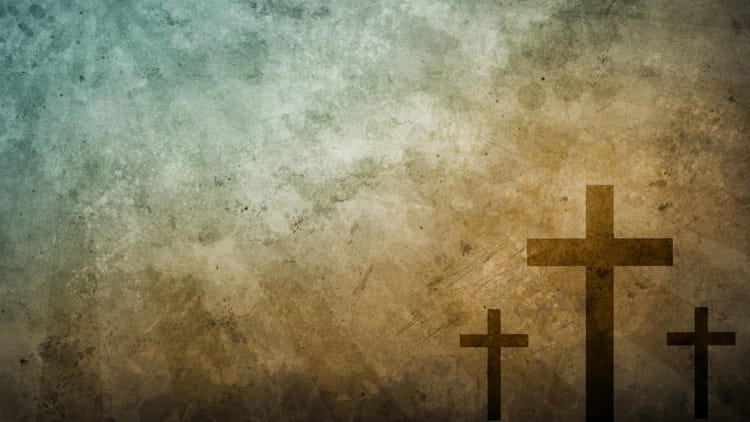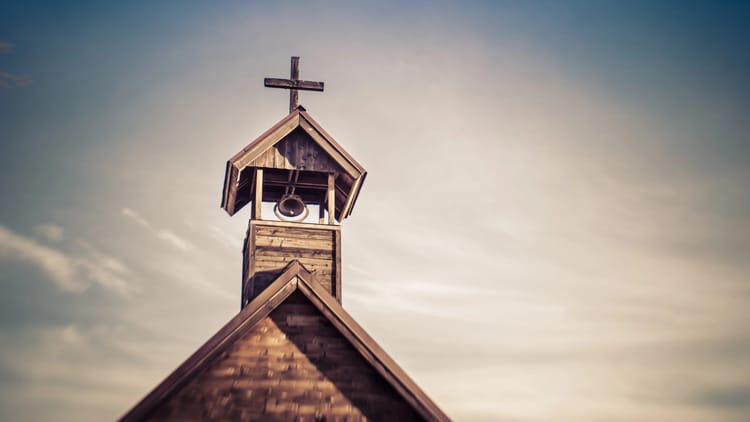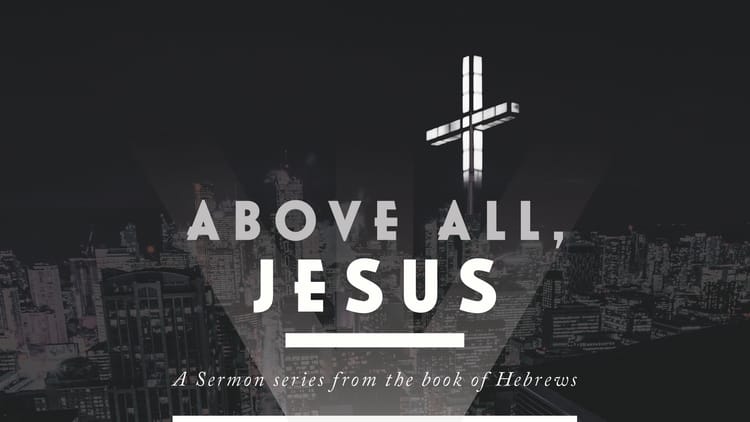Why Did Jesus Have to Die? (Hebrews 10:1-18)

Big Idea: The cross is essential because it allows God to forgive our sins while still upholding His justice, demonstrating the love and significance of Christ’s sacrifice for us.
As you read the events leading up to the death of Jesus, you feel like yelling out, “No!” You know what’s about to happen. You know that one of his chosen friends is about to desert him. You know that the minute he steps into Jerusalem, he’s on an irreversible course that will lead to his death. You wish that this time, the story could end up differently.
Jesus knew what was coming too. It wasn’t a surprise to him. He knew it was going to happen, and he could have stopped it at any time. You have to wonder why he would subject himself to that, which leads to a bigger question. If Jesus truly was God, what’s the deal with having to die anyway? Doesn't God set the rules? Couldn’t he have found a different way if he wanted to forgive us? It seems strange that God made this requirement that we had to die for our sins, and then subjected his own Son to this punishment. Why couldn’t he have just said, “Hey, it’s okay, I’ll forgive you.” Why did Jesus have to die?
This is an important question because the cross is central to Christianity and often seen as unattractive. The cross isn’t a thing of beauty. It’s an instrument of torture. It’s about as glamorous as a firing squad or an electric chair. It’s only because we haven’t seen a crucifixion that we can think of the cross as a nice thing. It’s ugly, but it’s at the center. The Apostle Paul said, “For I resolved to know nothing while I was with you except Jesus Christ and him crucified” (1 Corinthians 2:2 NIV).
Martin Luther called Christianity a theology of the cross. Why was the cross so necessary?
I want to look at a passage of Scripture that explains why the cross was so necessary, and what Jesus accomplished there. This passage is rooted in the Jewish faith. The readers would have been very familiar with the sacrifices that were taking place in the Temple, and they would have been familiar with a lot of the concepts that this passage talks about. This is a great passage to help us understand why the cross was so necessary.
It’s probably helpful to begin with a few background concepts, though. Anyone who ever encountered God was scared – not scared by any negative character qualities so much, but scared because God is so other, so exalted. If God is scary to begin with, imagine God when he’s angry. “It is a terrible thing to fall into the hands of the living God” (Hebrews 10:31).
It’s one thing for us to forgive others when they wrong us. An apology is really all that’s necessary. It’s different with God. His justice is so strong that he can’t just say, “Hey, I understand, no problem.” This creates a bit of a problem for God – one he chose to have – because he has a desire to forgive us. But he can’t do this without compromising his justice, just as a judge couldn’t say to a criminal, “Hey, no problem, forget about the law. I forgive you.”
God didn’t have to save us. He could have said, quite literally, “Go to hell.” He did with the angels. “God did not spare even the angels when they sinned; he threw them into hell, in gloomy caves and darkness until the judgment day” (2 Peter 2:4). Once he decided to save us, two of his character qualities presented a problem. His justice demanded that sin has consequences. His love made him want to forgive us. He could have been just and condemned us, and he could have been loving and just forgiven us, but how could he be loving and just at the same time?
Hebrews 10:1-4 says:
The old system in the law of Moses was only a shadow of the things to come, not the reality of the good things Christ has done for us. The sacrifices under the old system were repeated again and again, year after year, but they were never able to provide perfect cleansing for those who came to worship. If they could have provided perfect cleansing, the sacrifices would have stopped, for the worshipers would have been purified once for all time, and their feelings of guilt would have disappeared.
But just the opposite happened. Those yearly sacrifices reminded them of their sins year after year. For it is not possible for the blood of bulls and goats to take away sins.
We’ve just looked at God’s side of the problem. He wants to be loving and just and the same time. Now, here’s our side of the equation. We’ve offended God, actually made him angry – not a petulant anger, but a justified one. What do you bring a God that you’ve angered? What do you do to make things right? In the old Jewish system, you brought him a sacrifice. It’s the way that God commanded people to approach him. But it still didn’t work.
That’s a little frustrating. It’s like God has told us the only way that we can relate to him, and it’s still not enough. God says, “Try this,” and we try it, and God says, “No, that won’t do.” The problem with sacrifices is that they never do the job. If they did what we intended them to do, once would be enough. But it wasn’t. What we thought would lead us to God instead became a reminder of our own sins.
The sacrifices weren’t meant to do the job, it turns out. They were only meant to serve as a rough outline for what Jesus came to do. The writer calls it “a shadow of the things to come.”
This isn’t a new thought. It’s actually part of the old Jewish system, already hinted at in the Scriptures. Hebrews 10:5-10 quotes Psalm 40, and puts the words into Jesus’ mouth before he came to earth:
That is why Christ, when he came into the world, said,
“You did not want animal sacrifices and grain offerings.
But you have given me a body so that I may obey you.
No, you were not pleased with animals burned on the altar
or with other offerings for sin.
Then I said, ‘Look, I have come to do your will, O God-
just as it is written about me in the Scriptures.'”
Christ said, “You did not want animal sacrifices or grain offerings or animals burned on the altar or other offerings for sin, nor were you pleased with them” (though they are required by the law of Moses). Then he added, “Look, I have come to do your will.” He cancels the first covenant in order to establish the second. And what God wants is for us to be made holy by the sacrifice of the body of Jesus Christ once for all time.
Even back in the middle of offering sacrifices to God – even in the glory days – people realized it wasn’t enough. One of the problems with sacrifices is that imperfect people bring them. They could never do what needed to be done to satisfy God’s love and justice, or to allow us to approach God.
That’s where Jesus changed things. Jesus came to offer himself as a sacrifice. He came out of love to satisfy God’s justice. He cancelled the old sacrificial system (which was probably still going on at the Temple when this letter was written) and with one act dealt with our sins.
Hebrews 10:11-18 says:
Under the old covenant, the priest stands before the altar day after day, offering sacrifices that can never take away sins. But our High Priest offered himself to God as one sacrifice for sins, good for all time. Then he sat down at the place of highest honor at God’s right hand. There he waits until his enemies are humbled as a footstool under his feet. For by that one offering he perfected forever all those whom he is making holy.
And the Holy Spirit also testifies that this is so. First he says,
“This is the new covenant I will make
with my people on that day, says the Lord:
I will put my laws in their hearts
so they will understand them,
and I will write them on their minds
so they will obey them.”
Then he adds,
“I will never again remember
their sins and lawless deeds.”
Now when sins have been forgiven, there is no need to offer any more sacrifices.
Under the old system, sacrifices were made daily. With Christ, one sacrifice was offered for all time. When the priests offered the sacrifices under the old system, they remained standing. When Christ offered himself as a sacrifice, he returned and sat at the right hand of God, because the work was done. No more sacrifices were required. Under the old system, sins weren’t taken away; they were just covered over. With Christ’s sacrifice, sin wasn’t just covered. It was removed. Our sins have been completely forgiven because of the one, decisive act of Jesus Christ. He doesn’t even remember our sins.
That’s something we can build our lives on. Here, we find answers to our inadequacies. It’s not up to us. Christ has already dealt with our inadequacies. They’ve been forgiven.
Christ has dealt with our insecurity. We don’t have to worry about our future offenses. They’ve already been dealt with.
We’re safe here. There really isn’t a place in this world in which we’re completely safe. There’s no person who is completely safe, no matter how close a relationship we may have with them. We can never let our defenses down completely – except at the cross. The cross is the one place where we’ve been completely forgiven, where we’re completely safe.
Here we find a solution to our nagging, debilitating guilt. Here we find a place of permanence, stability in which we will always be “home” – we find our presence of rest in the presence of God himself.
Romans 8:1 says, “So now there is no condemnation for those who belong to Christ Jesus.” Why did Jesus have to die? It was the only way God could save us while maintaining both his love and his justice. It’s the only way we could approach him. It’s the only way we could be safe with God.
Prayer:
Praise for Christ’s work
“My sins not in part but the whole, are nailed to the cross and I bear them no more”
Invitation to receive Christ’s work of forgiveness





